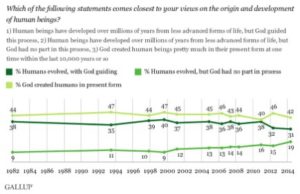No Contest; No Victory
A few years ago Rachael Gross wrote an article for Slate entitled: “Evolution is Finally Winning Out Over Creationism.” She noted how few issues have divided Americans as bitterly as Darwin’s theory of evolution by natural selection. She thought it was “woeful” that “the majority of people in Europe and in many other parts of the world accept evolution,” while 4 in 10 adult Americans believe that humans have existed in their present form since the beginning of time. Evolutionary theory does not exist in a vacuum, she said. It is supported by findings in geology, paleontology, biomedicine, and other fields. “If we want to be a nation of politically and scientifically literate and informed people, then we have to teach good science—and that starts with evolution.”
But we need to ask what kind of evolution and what kind of creationism she means. Is it evolution that occurred entirely through natural processes or did a supreme being use evolution to bring about and develop nature? There also should be a consistent distinction between individuals who hold that humans have existed in their present form since the beginning (PFB) from those who believe in evolution guided by a supreme being (ESB), and those who affirm humans evolved by natural processes (ENP). Gross also cited two polls in her discussion. Although each poll used a different construct to describe what they meant by “creationism,” she did not point out the differences between them.
One poll was by Gallup and one was by the Pew Research Center. When Gross discussed changes since 2009 in the Pew surveys, the 2009 data can be found here. The Pew 2014 poll looking at evolution did not break down all the age groups by the three categories on origins. But it did report that US adults overall were as follows: 31% said humans existed in their present form from the beginning (PFB); 24% believed their evolution was guided by a supreme being (ESB); and 35% believed evolution occurred from a natural process (ENP). When looking at individuals between the ages of 18-29 in 2009 and 2014 from the Pew polls, on their views of human origins, we get the following data.
 So there is evidence suggesting younger American adults are adjusting their position on human origins to the secular evolution position. But when Gross said that 73% of US adults under 30 believe in some kind of evolution, she combined believers in evolution through natural processes, or secular evolution, with those who believed in evolution through a supreme being. There is a significant philosophical gap between the action of a supreme being creating human beings, either through evolution or as fully formed individuals, and humans evolving through an entirely natural process without the action of a supreme being. See “Structure of an Evolutionary Revolution” on this website for more on this difference.
So there is evidence suggesting younger American adults are adjusting their position on human origins to the secular evolution position. But when Gross said that 73% of US adults under 30 believe in some kind of evolution, she combined believers in evolution through natural processes, or secular evolution, with those who believed in evolution through a supreme being. There is a significant philosophical gap between the action of a supreme being creating human beings, either through evolution or as fully formed individuals, and humans evolving through an entirely natural process without the action of a supreme being. See “Structure of an Evolutionary Revolution” on this website for more on this difference.
Within the Pew 2014 Religious Landscape Study, 73% of individuals between the ages of 18-29 were fairly certain or absolutely certain there was a God; another 8% believed in God, but were not too certain of that belief; and 19% did not believe in God or did not know if they believed in God. So there would seem to be a large portion of 18 to 29 year old individuals (perhaps 32%) who believed in God and who also believed in natural evolution. I don’t think they should be referred to as necessarily gravitating towards secular evolution. If their belief in God holds, a category like deistic evolution would seem to better describe them. The category of individuals who believe God created through evolution, ESB, also has the potential to grow larger as views on human origins shift. It is not an inevitable transition to an entirely secular sense of evolution as the older group of people believing humans existed in their present form from the beginning die off.
The Gallup poll Rachel Gross mentioned added a further distinction to the humans created in their present form by adding that God created humans in their present form 10,000 years ago. This position on human origins would be consistent with a group of Christian believers known as young earth creationists (YEC), which hold that all things were created within the 10,000-year timeframe. However, there is a necessary distinction between YEC and PFB—humans existed in their present form since the beginning—if the beginning of the heavens and earth was billions of years ago, and the creation of beginning of humans was significantly longer than 10,000 years ago. This position is what Denis Lamoureux and others have referred to as progressive creationism. See his web lectures in “Beyond the ‘Evolution’ vs. ‘Creation’ Debate,” particularly “Views on the Origin of Universe & Life.”
But an option consistent with a progressive creationist position of human origins was not offered in the Gallup poll—or in any other poll on human origins that I am aware of. The Gallup poll has been asking the same three-part question about human origins, given as follows, since 1982:
Which of the following statements comes closest to you views on the origin and development of human beings? 1) Human beings have developed over millions of years from less advanced forms of life, but god guided this process. 2) Human beings have developed over millions of years from less advanced forms of life, but God has no part in this process. 3) God created human beings pretty much in their present form at one time within the last 10,000 years or so.
The Gallup and the Pew polls implicitly include the evolution—creation dichotomy in the structure of their questions. In both surveys there are two evolutionary positions and one creationist position. The Pew questions more accurately focused on the flash point issue of human evolution, while the Gallup poll collapses the age of the earth variable—held only by young earth creationists—into their creationist position. Not surprisingly, the percentages between the two polls show some differences. The following Gallup chart illustrates the results on the issue dating back to 1982.
As a result, a creation-evolution dichotomy is perpetuated. Arguing that Christians need to choose between science and religion has become entrenched in the dispute since the Scopes Trial. And “fundamentalists” are as much to blame as those holding to a secular or godless sense of evolution. Ironically, William Jennings Bryan held and publicly affirmed a human origins position consistent with what I’ve identified here as progressive creation. He saw Darwinism as a dangerous idea because he thought people would lose their consciousness of God’s presence in their daily lives.
In a speech he first gave in 1904, “Prince of Peace,” Bryan said he had a right to assume a Creator back of the creation. “And no matter how long you draw out the process of creation, so long as God stands back of it you cannot shake my faith in Jehovah.” In Summer for the Gods, Edward Larson commented how this allowed for an extended geologic history and even for a kind of theistic evolution. But Bryan “dug in his heels” regarding the supernatural creation of humans. He saw it as “one of the test questions of the Christian.”
I do not carry the doctrine of evolution as far as some do; I am not yet convinced that man is a lineal descendent of the lower animals. I do not mean to find fault with you if you want to accept the theory; all I mean to say is that while you may trace your ancestry back to the monkey if you find pleasure or pride in doing so, you shall not connect me with your family tree without more evidence than has yet been produced.
He concluded his speech by saying that one of the reasons he objected to the theory of evolution was because if man was linked to the monkey, it became an important question whether humanity was going towards the monkey or coming away from him. “I do not know of any argument that may be used to prove man is an improved monkey that may not be used just as well to prove that the monkey is a degenerate man, and the latter theory is more plausible than the former.” You can listen to a vocal dramatization of his speech here on YouTube; there is a text only copy here. There are content differences between the two because Bryan gave the speech repeatedly over the years. The given quotes are from the text of the oral YouTube version of “Prince of Peace.”
The Bill Nye-Ken Ham debate in 2014 had neither the historical significance nor the drama of the Scopes Trial. But it does illustrate how times have changed and how, rightly or wrongly, the young earth creationist position on human origins, represented by Ken Ham, has become identified as the default view of biblical Christians. You can watch a video on the debate here.
An NPR article, “Who ‘Won’ the Creation vs. Evolution Debate?,” noted the live online debate drew 500,000 viewers at one point. By the middle of November in 2016, the YouTube video had over 5,700,000 views. Britain’s Christian Today website took a poll on who “won” the debate and had 42,567 responses. Ninety two percent thought Bill Nye won, while only 8 percent thought Ken Ham won. Michael Schulson, writing for The Daily Beast, thought Nye’s willingness to engage Ham in a debate threatened to reduce substantive issues to mere spectacle.
The televangelist Pat Robertson thought Ken Ham made a mockery out of Christians. Quoted in The Christian Post, Robertson said he was able to find his faith in the evolutionary process itself. “I don’t believe in so-called evolution as non-theistic. I believe that God started it all and he’s in charge of all of it. The fact that you have progressive evolution under his control. That doesn’t hurt my faith at all.” You can watch a short video of Robertson’s views on The Christian Post link. Robertson further said: “Let’s be real; let’s not make a joke of ourselves.”
A little over a month after the Scopes Trial concluded, Clarence Darrow wrote to H. L. Mencken, one of the reporters who covered the Scopes Trial: “I made up my mind to show the country what an ignoramus he [Bryan] was and I succeeded.” The more things change, the more they stay the same. Christians believing in creation are still seen and portrayed as ignoramuses. The Memphis paper, the Commercial Appeal made the following comment about the infamous exchange between Darrow and Bryan in the Scopes Trial:
It was not a contest. Consequently there was no victory. Darrow succeeded in showing that Bryan knows little about the science of the world. Bryan succeeded in bearing witness bravely to the faith which he believes transcends all the learning of men.
If you are interested in learning more about the Scopes Trial, try this page about the Scopes Trial Museum or the Wikipedia page on the Scopes Trial. You can also read: Summer for the Gods, a Pulitzer Prize winning book about the Scopes Trial and “Structure of an Evolutionary Revolution.” Also, look at: When All the Gods Trembled, which discusses Darwinism and the Scopes Trial.


